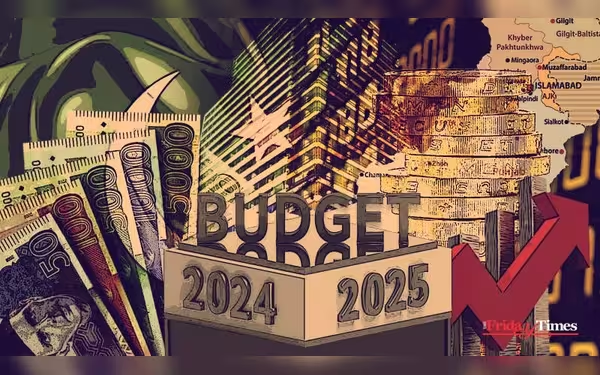Thursday, July 4, 2024 06:22 PM
Pakistan's Fiscal Challenges Highlighted in Budget Approval
- Rushed budget approval process disregards key recommendations from Senate
- Oppressive tax system disproportionately affects the poor
- Lack of parliamentary oversight perpetuates poverty and economic instability
 Image Credits: thefridaytimes
Image Credits: thefridaytimesThe approval of Pakistan's Federal Budget 2024-25 sheds light on fiscal challenges, including regressive taxation and lack of oversight, emphasizing the need for comprehensive reforms.
An imbalance between government spending and tax revenue has raised concerns among lawmakers in Pakistan, sparking fears of a potential debt crisis. The recent approval of the Federal Budget 2024-25 and Finance Bill 2024 by the National Assembly has come under scrutiny for its rushed process and lack of substantial debate. This swift approval, completed in just 27 days with last-minute amendments, has disregarded key recommendations from the Senate, highlighting a disregard for constitutional obligations.
During the budget approval process, elected officials often prioritize their own interests over the needs of the population, neglecting crucial social services and economic policies aimed at uplifting marginalized communities. This disconnect between lawmakers and the people they represent underscores a pressing issue in Pakistan's governance.
The Finance Act passed by the National Assembly continues an oppressive tax system, heavily reliant on indirect taxes that disproportionately affect the poor. Despite claims of positive outcomes by the Finance Minister, the adverse effects of regressive taxation on the economy and vulnerable populations remain unaddressed.
The lack of meaningful debate and oversight of tax legislation by Parliament highlights its role as a rubber stamp, with decisions influenced by external entities like the International Monetary Fund. This focus on revenue targets without addressing underlying fiscal imbalances perpetuates poverty and economic instability in the country.
Efforts to tackle the fiscal deficit are hindered by an imbalance between direct and indirect taxes, leading to an increasing number of Pakistanis living below the poverty line. The reliance on amnesty schemes to legalize untaxed assets further complicates revenue collection and financial transparency.
While the government has committed to revenue targets to secure IMF assistance, the real challenge lies in controlling expenditures and implementing effective economic policies. The history of amnesty schemes and the persistent failure to broaden the tax base emphasize the urgent need for comprehensive reforms to ensure sustainable economic growth and equitable resource distribution.
The approval of the Federal Budget 2024-25 in Pakistan has shed light on the country's fiscal challenges, including a reliance on regressive taxation, lack of parliamentary oversight, and the need for comprehensive reforms. Addressing these issues is crucial for promoting economic stability, reducing poverty, and ensuring equitable distribution of resources for all Pakistanis.













